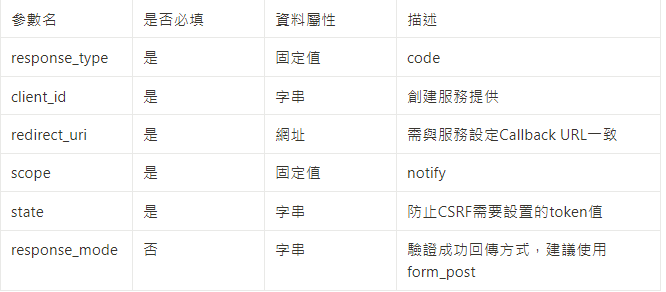好的,根據前一篇所提到的OAuth2.0流程,我們需要
1.取得code(Authorization Grant)
2.取得access token
才能利用後續的服務
GET https://notify-bot.line.me/oauth/authorize
需要參數
成功則回傳至請求所帶的redirect_uri
失敗則回傳至請求所帶的redirect_uri
@GetMapping("sendToOauth")
public void sendToOauth(@RequestParam(name="account")String account,HttpServletRequest request,HttpServletResponse response) throws ServletException, IOException {
String url = userService.getOAuthCode(account);
response.sendRedirect(url);
}
@Override
public String getOAuthCode(String account) {
StringBuilder sb = new StringBuilder();
//資料庫取得使用者資料
User findResult = Optional.of(userDao.findFirstByAccount(account)).orElseThrow(
()->
new UserServiceException(
UserServiceErrorEnum.USER_DATA_NOT_FOUND.getError(),
UserServiceErrorEnum.USER_DATA_NOT_FOUND.getMessage())
);
//設定請求資料
LineOAuthRequest lineOAuthRequest = new LineOAuthRequest();
lineOAuthRequest.setClient_id(client_id);
lineOAuthRequest.setRedirect_uri(redirect_uri);
lineOAuthRequest.setState(findResult.getState());
Map<String,Object> variableParams = lineOAuthRequest.getUriParams();
//組裝GetOAuth URL字串
sb.append(LineNotifyUrl.GET_OAUTH.getUrl()).append("?");
for(String key:variableParams.keySet()) { sb.append(key)
.append("=")
.append(String.valueOf(variableParams.get(key)))
.append("&");
}
sb.deleteCharAt(sb.length()-1);
return sb.toString();
}
@Data
@NoArgsConstructor
public class LineOAuthRequest {
private String client_id;
private String redirect_uri;
private String response_type = "code";
private String scope = "notify";
private String state;
private String response_mode="form_post";
public Map<String, Object> getUriParams(){
try {
//檢查值並回傳 屬性名與值構成的鍵值對
beforeSendCheck();
return ApiUtil.getRequestUriVariables(this);
}
catch (Exception e) {
throw new LineOauthRequestException(4,e.getMessage());
}
}
public void beforeSendCheck() {
if(!StringUtils.hasText(client_id)) {
throw new LineOauthRequestException(1,"client_id is empty");
}
else if(!StringUtils.hasText(redirect_uri)) {
throw new LineOauthRequestException(2,"redirect_uri is empty");
}
else if(!StringUtils.hasText(state)) {
throw new LineOauthRequestException(3,"state is empty");
}
}
}
public static <T> Map<String, Object> getRequestUriVariables(T source) throws NoSuchMethodException, SecurityException, IllegalAccessException, IllegalArgumentException, InvocationTargetException{
Map<String, Object> returnMap = new HashMap<>();
Field[] fields = source.getClass().getDeclaredFields();
for(int i=0;i<fields.length;i++) {
String fieldName = fields[i].getName();
String firstLetter = fieldName.substring(0,1).toUpperCase();
String getter = "get"+firstLetter+fieldName.substring(1);
Method method = source.getClass().getMethod(getter, new Class[] {});
Object value = method.invoke(source, new Object[] {});
returnMap.put(fieldName, value);
}
return returnMap;
}
POST https://notify-bot.line.me/oauth/token
ContentType: application/x-www-form-urlencoded
需要參數
code無論最後結果成功或只能使用一次,並設定有失效時限
這邊有遇到奇怪的點,在取得access token的請求設定redirect_uri,如果與取得code設定的redirect_uri不一致的話,會回傳redirect_uri not match的錯誤。
就算我在Callback URL設定第二個redirect_uri依然是一樣的錯誤,如果有大大知道原因歡迎下方留言告訴我。
成功回應
Content-Type:application/json
@Override
public void getToken(LineOAuthResponse lineOAuthResponse) throws InvalidKeyException, UserServiceException, IllegalBlockSizeException, BadPaddingException {
//LineOAuthResponse:getOAuth成功回傳物件
//設定表頭參數
String code = lineOAuthResponse.getCode();
String state = lineOAuthResponse.getState();
HttpHeaders headers = new HttpHeaders();
headers.setContentType(MediaType.APPLICATION_FORM_URLENCODED);
MultiValueMap<String, String> params= new LinkedMultiValueMap<String, String>();
params.add("grant_type", "authorization_code");
params.add("code", code);
params.add("redirect_uri", token_redirectUri);
params.add("client_id", client_id);
params.add("client_secret", token_secret);
HttpEntity<MultiValueMap<String, String>> entity = new HttpEntity<>(params,headers);
LineTokenResponse result = restTemplate.postForObject(LineNotifyUrl.GET_TOKEN.getUrl(), entity, LineTokenResponse.class);
if(HttpStatus.OK.value()!=result.getStatus()) {
throw new UserServiceException(
UserServiceErrorEnum.USER_TOKEN_BACK_ERROR.getError(),
UserServiceErrorEnum.USER_TOKEN_BACK_ERROR.getMessage());
}
//成功取得回應後根據state取出對應的用戶資料
User origin = Optional.of(userDao.findFirstByPassword(state)).orElseThrow(
()->
new UserServiceException(
UserServiceErrorEnum.USER_DATA_NOT_FOUND.getError(),
UserServiceErrorEnum.USER_DATA_NOT_FOUND.getMessage())
);
//新增token值後更新回資料庫
origin.setToken(result.getAccess_token());
userDao.save(origin);
}
@Data
public class LineTokenResponse {
private Integer status;
private String message;
private String access_token;
}
OK 取得access token,我們在就可以傳訊息給使用者啦~
下篇
Line Notify API 串接實作(二)-推播訊息
